Sometimes the tables are turned and the predator becomes the pursued.
- Occasionally I rerun a favorite older post because many of my current readers have never seen it. I originally published these photos on May 28, 2011. For this version of the post I’ve rewritten much of the text and cleaned up the formatting. The images are smaller than usual because there are so many of them I was afraid larger ones would load slowly for some readers. All photos are presented in the order they were taken.
Back in May of 2011 I witnessed a completely unexpected drama during one of my bird photography excursions to Antelope Island. It all started with the frantic calling of a Long-billed Curlew in obvious distress as it repeatedly flew over my pickup.
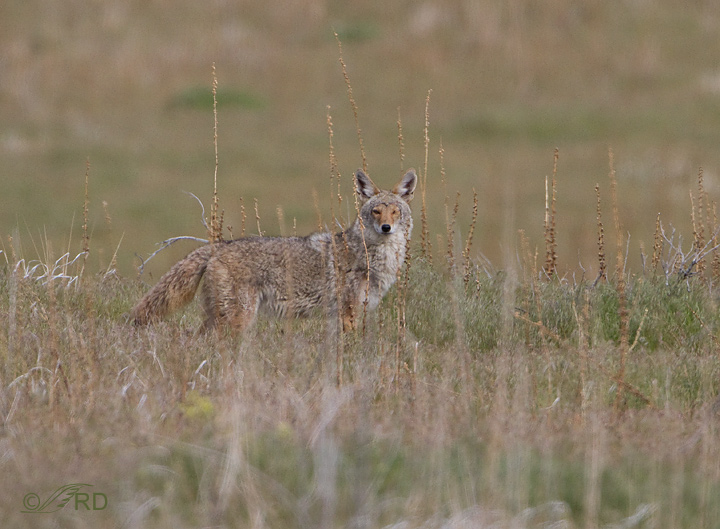
1/2500, f/6.3, ISO 640, Canon 7D, Canon EF 500mm f/4L IS II USM
At first I didn’t know what was causing all the ruckus but soon we spotted this coyote in the area. A couple of minutes later we noticed a second coyote nearby. The curlew must have had a nest in the vicinity and it was obviously disturbed by the presence of the foraging coyotes. Soon both coyotes disappeared into a small ravine but we hung around hoping for more flight shots of the curlew.
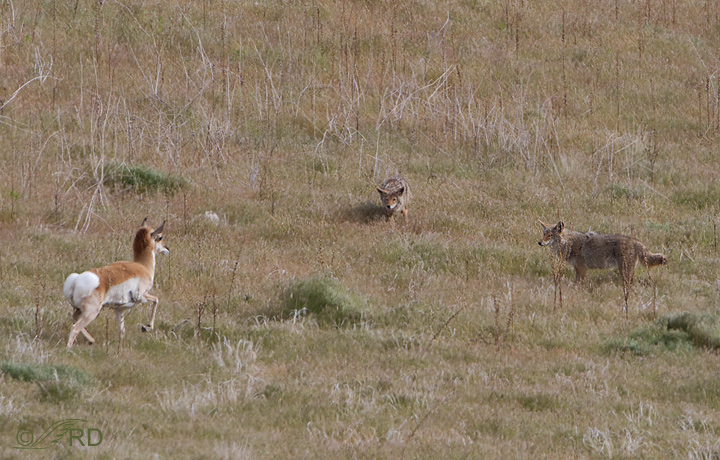
1/1600, f/7.1, ISO 640, Canon 7D, Canon EF 500mm f/4L IS II USM
Then, almost a quarter-mile away, we spotted the coyotes again but this time a doe Pronghorn had entered the scene. There was obviously going to be a confrontation and at first I assumed that the coyotes would be the aggressors but I was quickly proven wrong. Notice that she’s flashing her white rump in alarm as she confronts the wary coyotes.
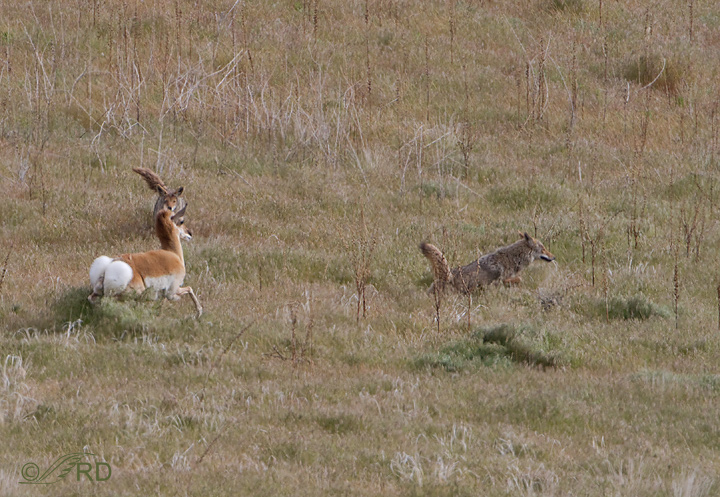
1/1600, f/7.1, ISO 640, Canon 7D, Canon EF 500mm f/4L IS II USM
After a few seconds of staring each other down she charged the coyote on the right who quickly turned tail. This doe had pluck!
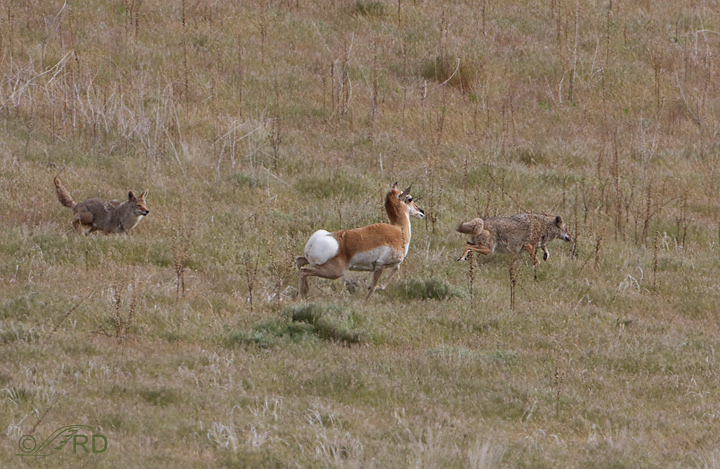
1/1600, f/7.1, ISO 640, Canon 7D, Canon EF 500mm f/4L IS II USM
As that coyote beat a hasty retreat the teamwork of the coyotes came into play. During this part of the encounter the coyotes always stayed a short distance apart and whenever the doe would charge one of them the other one would threaten the pronghorns flank, as the one on the left is doing here, so she would have to break off her attack.
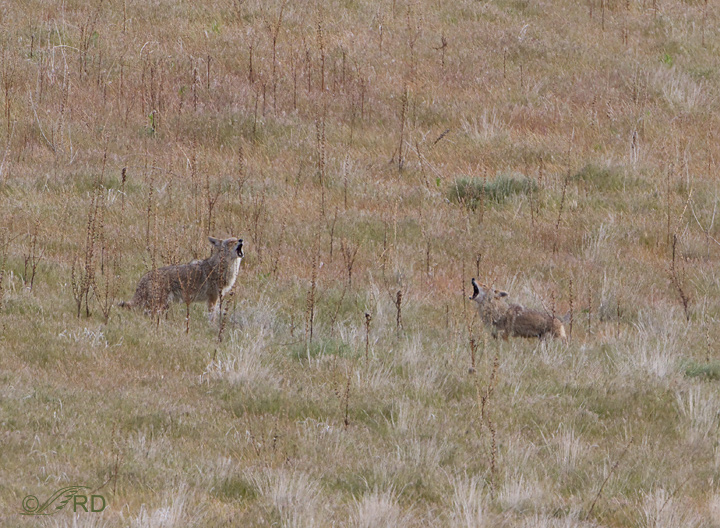
1/1600, f/7.1, ISO 640, Canon 7D, Canon EF 500mm f/4L IS II USM
After several similar encounters and with the doe out of frame to the right the coyotes began howling and yipping – perhaps in frustration but of course I don’t really know their motivation. This serenade went on for perhaps 20 seconds and believe me it was loud!
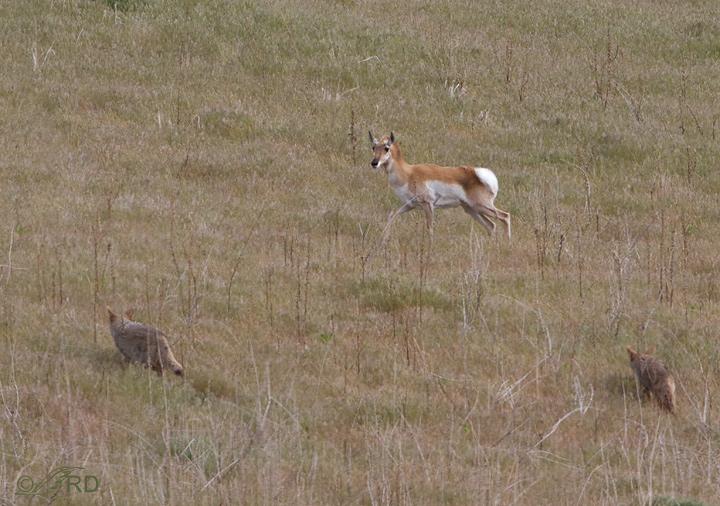
1/1250, f/7.1, ISO 640, Canon 7D, Canon EF 500mm f/4L IS II USM
But the Pronghorn wasn’t yet willing to give up on her harassment of the coyotes. She would slowly approach them as she watched for an opening and…
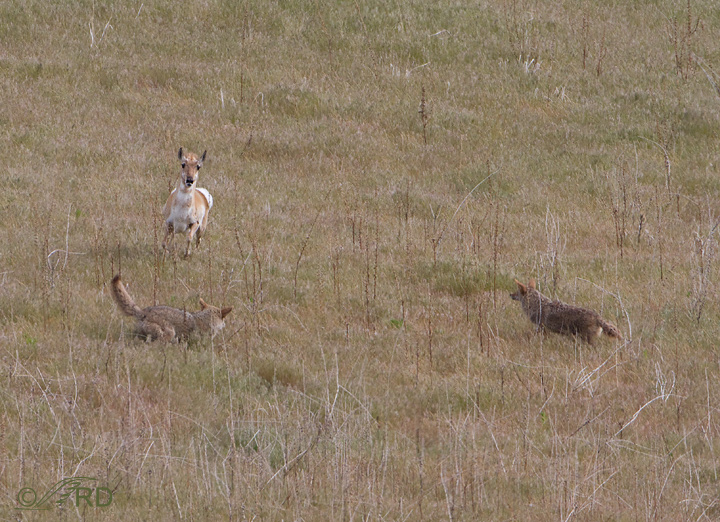
1/1600, f/7.1, ISO 640, Canon 7D, Canon EF 500mm f/4L IS II USM
when an attack came it came very quickly.
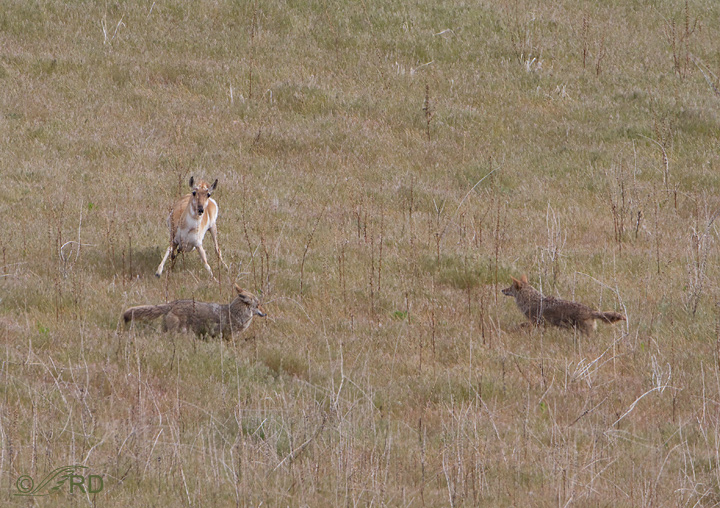
1/1600, f/7.1, ISO 640, Canon 7D, Canon EF 500mm f/4L IS II USM
Notice once again that when she attacks one coyote…
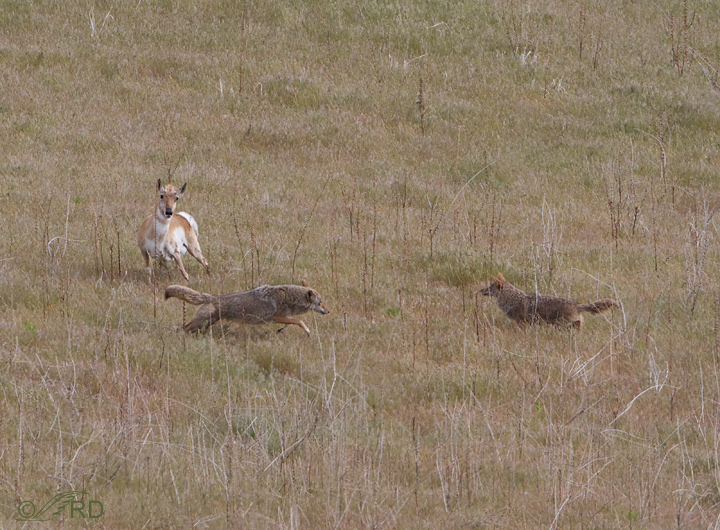
1/1250, f/7.1, ISO 640, Canon 7D, Canon EF 500mm f/4L IS II USM
the other one threatens her flank so she has to veer off for her own safety.
1/1600, f/7.1, ISO 640, Canon 7D, Canon EF 500mm f/4L IS II USM
It seemed obvious to me that the intent of the pronghorn was to drive the coyotes out of the area. It’s fawning time on the island (I saw multiple fawns that morning) and perhaps there were hidden youngsters nearby though I never did see any. Whatever her motivation she continued to herd the coyotes up the very large hill.
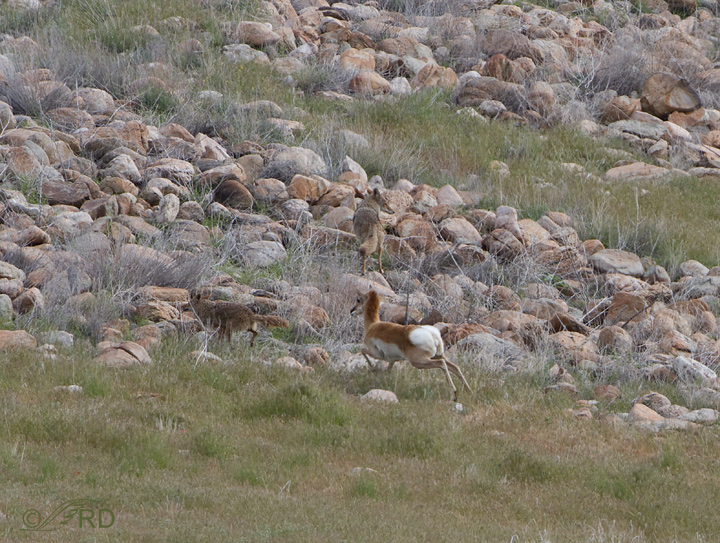
1/1250, f/7.1, ISO 640, Canon 7D, Canon EF 500mm f/4L IS II USM
The coyotes seemed to deliberately head for these rocks, perhaps knowing that she would be reluctant to follow them there and if so they were right. But she got in one last lick before it was too late.
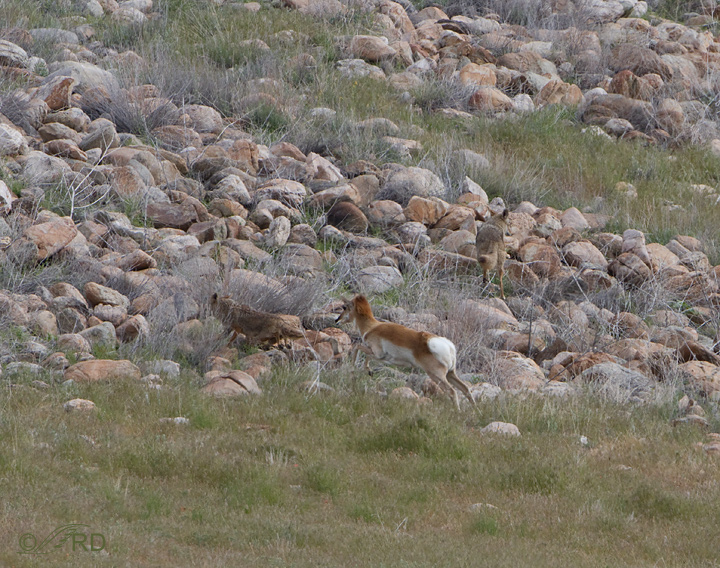
1/1600, f/7.1, ISO 640, Canon 7D, Canon EF 500mm f/4L IS II USM
This is the closest I saw her get to either one of the coyotes and they never made actual contact that I’m aware of, though they came close. This wasn’t a game – it was obviously serious stuff.
The coyotes hung out in the rocks for a while and when it became apparent that she was reluctant to follow them there …
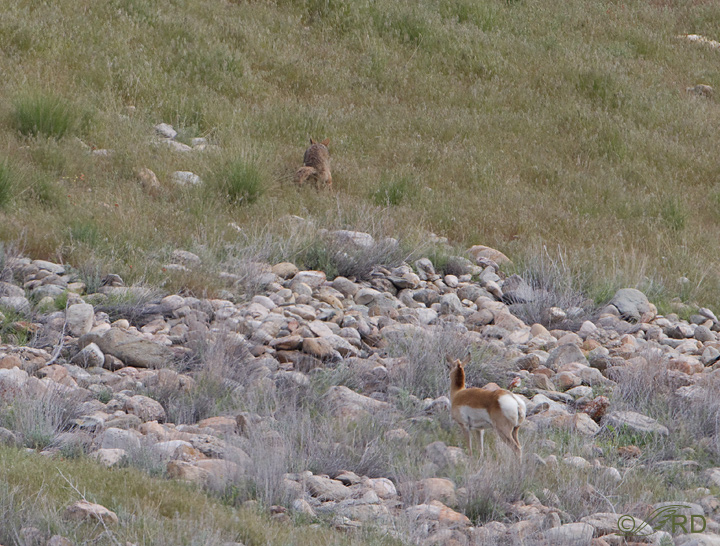
1/1250, f/7.1, ISO 640, Canon 7D, Canon EF 500mm f/4L IS II USM
they turned their backs on her and walked nonchalantly up the hill. Here she seems to be looking on in frustration since she can’t or won’t follow them through the rocks.
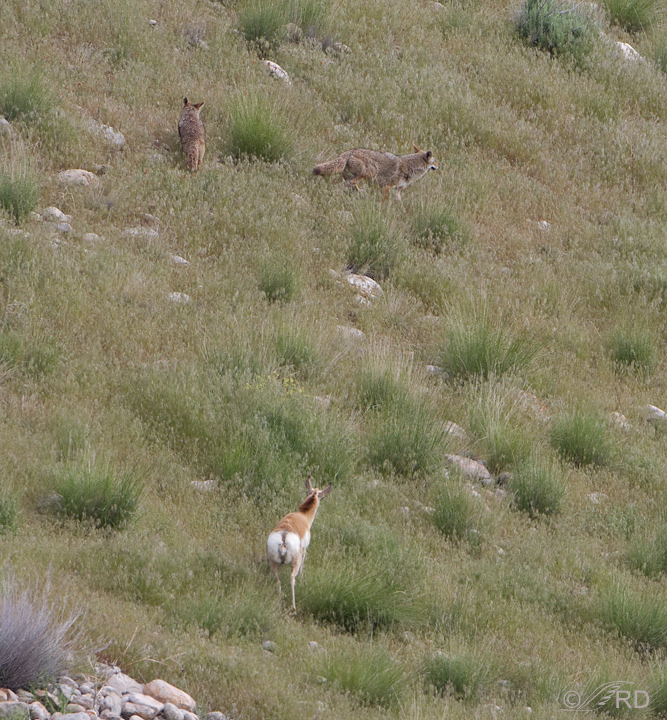
1/1000, f/7.1, ISO 640, Canon 7D, Canon EF 500mm f/4L IS II USM
But she still wasn’t ready to give up so instead she circled around the rocks, caught up to the coyotes..
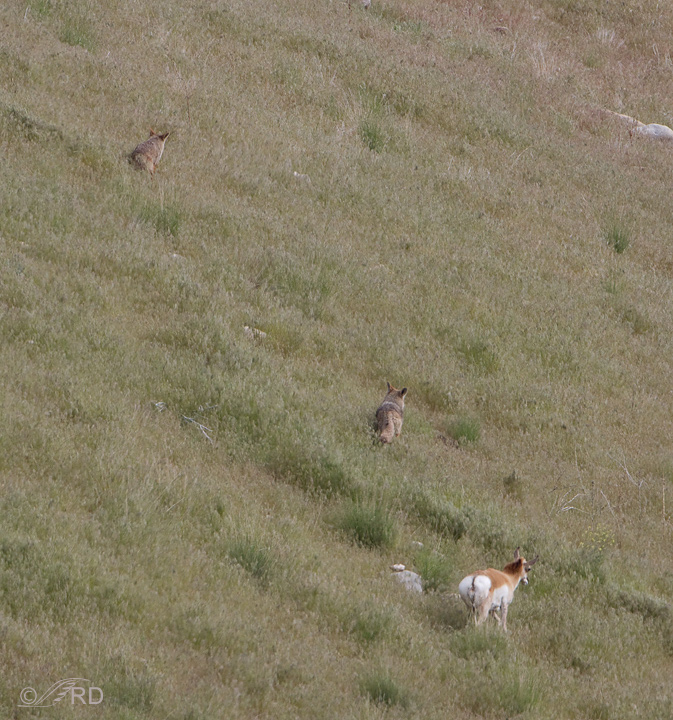
1/1600, f/6.3, ISO 640, Canon 7D, Canon EF 500mm f/4L IS II USM
and continued to put on slow but steady pressure on them…
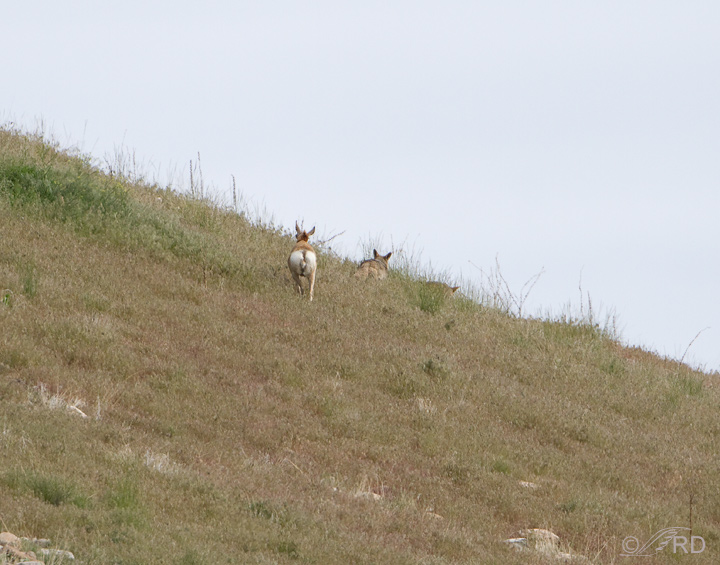
1/2000, f/6.3, ISO 640, Canon 7D, Canon EF 500mm f/4L IS II USM
until all three disappeared over the crest of the hill about a half mile away.
At this point I realized there was a possibility that I could get more photos of this little drama if I drove the circuitous mile and a half (had to follow the road) to the top of the hill and tried to find them again. I drove it as fast as I dared but I got there just in time for all three animals to cross the road right in front of me (with the doe still pressuring the coyotes) and disappear to the north.
You can imagine how thrilled I was to have witnessed such an interesting display of behaviors – few folks ever see an encounter like this and I even got photos of it.
What a treat! I haven’t seen anything like it before or since.
Ron


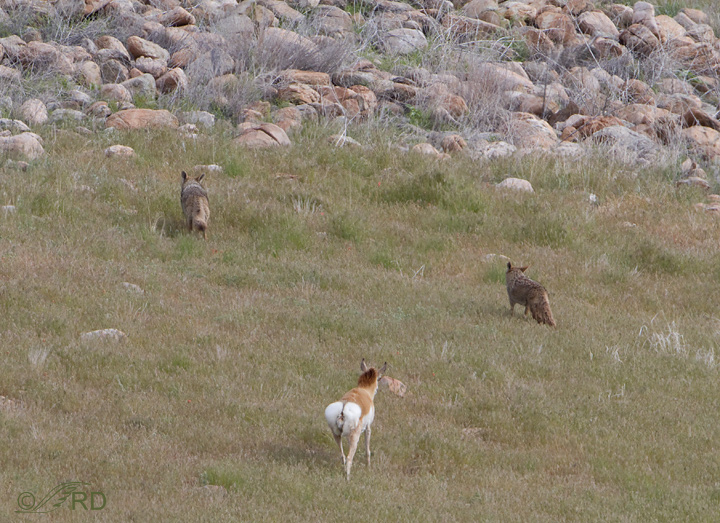
Nice job of describing the action, and enjoyed to rare images too: Wily coyotes vs brave female pronghorn, two animals I always enjoy seeing.
A very good wildlife tip is do NOT mess with mothers!! The vast majority of them WILL hurt you without a second thought! Another good tip is do not EVER frighten or threaten a vulture. Their defense mechanism is projectile vomiting. You do NOT want to go there 😉 But I digress.
As usual, I just love your behavioral series! It’s fascinating to get a look into their private lives because all sorts of things happen in The Great Out There that humans rarely see. As I mentioned in an earlier post, critters are NOT monolithic in their behavior, but instead each individual approaches life in their individual ways. Except for mothers–they’re basically evil when you threaten or think about threatening their kids. I keep wondering why humans don’t seem to get that and insist upon walking underneath a raptor’s nest instead of walking around (significantly around) that nest for a little while. And they wonder why they get attacked…DUH! What would YOU do in similar circumstances?
Wonderful group! Had a great time catching up on your blog today as I continue my weeklong work marathon. You are always interesting, educational and especially this week – thought provoking.
“You are always interesting, educational and especially this week – thought provoking.”
I couldn’t ask for much more than that, Joanne. Thanks very much.
What an incredible series.
That white rump she is flashing is heart shaped – and her heart was bigger than a mountain.
Interesting observation, EC.
I so enjoyed seeing your documentation of a very real life drama ! The coyotes in your photos are much larger than the ones we see here in Missouri .
Do they pose a serious risk to an adult pronghorn ? Is it common for them to hunt with another coyote or in a group ? Thank you for a great sequence of photos and another well narrated story .
Laurel, I see them hunting often both singly and in pairs – rarely more than that.
I think it would be unusual for coyotes to take on a healthy, adult pronghorn. Normally pronghorn don’t seem to be afraid of them though they do keep a wary eye on coyotes if they’re close.
I really enjoyed this series…love it when targeted prey turns the tables…maybe my intense dislike for “bullying”–was instilled in me many years ago, when, as the only girl in my class, I was subject to bullying by the teacher’s son—until the day I was cornered—scared and desperate, I suddenly snapped and beat the daylights out of him!!!
Good for you, Patty!
You GO, Patty! 🙂
Good timing for you. That is so interesting. Thanks for posting your unique day!
I’m glad you enjoyed it, Jean.
Thanks for showing the photos and story as it played out. Really interesting to see, and they are great pictures.
Thank you, Trudy.
What a wonderful post! I am so glad you saw it and reposted it. I have a lot of respect for this Pronghorn doe – I suspect she had good reason for harassing the Coyotes, but she seems to have gone on beyond the call of duty. She probably wanted to make sure that the Coyotes stayed away from her – that they learned a lesson from the encounter.
I’m fairly confident that “reason” was one or more youngsters hidden nearby in the grass, Susan.
Those are some great photos. I know you get up early in the morning and drive a long ways. It’s nice to see you rewarded for your hard work. I also want to thank you for sharing your experiences.
Yup, I’m an early bird for photography, Jack. Thanks.
Wonderful to watch, I am happy you caught it to share with us.
Me too, April.
Hurray for the fierce mothers of the world—-here’s hoping that she would have had backing from the rest of her pronghorn community if she had needed it……tag-team coyotes are remarkably resourceful: I once watched one invite a small dog (which was being walked by its owner ) with a “play-bow” to the little dog.. The human remarked that she had never known a coyote to “play” with
domestic dogs….I pointed out to her that there was a second coyote in the bushes about 50 feet away–playful, indeed !
Kris, In my experience they usually are pretty isolated with their fawns when they’re very young. As far as I know she was pretty much on her own (I was unaware of any other pronghorn nearby) so she probably knew she was on her own in dealing with the threat.
Fascinating. She was serious about “You coyotes! Get off my lawn.”
Thanks, Arwen.
Great post and great behavior shots. I think it is neat that a female Pronghorn has the guts/fortitude to behave this way! I have to wonder what would have happened if two does teamed up together to go after the Coyotes. Is that possible that two Pronghorns would work together to move a predator away from the fawning area? Very, very interesting stuff!
Thanks Dick. I would think it would be very possible.
The coyotes certainly can be on the wrong end of the stick upon occasion! Great series, Ron! We have one whitetail doe around that isn’t impressed by our border collie trying to run her out of the yard. Fortunately, the dog is fast and not interested in messing with those hooves tho she will run when I show up!
Coyotes take a lot of abuse, Judy – from humans and otherwise. I’ve seen and photographed many injured coyotes and even the voles often bite them on the tongue in a final show of defiance before they go down the hatch.
They do – we had one on 3 legs in the yard one winter – suspect it was getting dog food plus the shelter of the spruce trees. It did move out of the yard once we knew it was there but was on the other side of the creek for quite awhile.
Good for her! Those coyotes look fairly well-fed, so I’m wondering if that played a role in their retreat. I’m guessing they probably could have taken her down by tag teaming her if they were desperate. And yes, coyotes can be ear-splitting when they want to be!
Thank you for bringing this one around again. Fascinating behaviors!
I’m glad you enjoyed it, Marty. Against the side of the hill which reflected the sound in my direction those yips and howls were impressively loud.
Great story and photos Ron. I would have thought the coyotes would have been the aggressors towards her. Mother Nature always surprises me, and keeps me learning. Thanks for the great wildlife behavior lesson Ron.
Thanks, Ed. I think they were looking for hidden fawns and didn’t want to risk an attack on a pissed off mama.